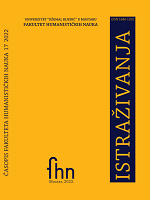TRANSCENDING THE BINARY: VIEWS, VOICES, PEOPLE, AND PLACES IN/OF JEFFREY EUGENIDES’S MIDDLESEX
TRANSCENDING THE BINARY: VIEWS, VOICES, PEOPLE, AND PLACES IN/OF JEFFREY EUGENIDES’S MIDDLESEX
Author(s): Selma RaljevićSubject(s): Sociology of Culture, Sociology of the arts, business, education, Theory of Literature, Sociology of Art, American Literature, Sociology of Literature
Published by: Fakultet humanističkih nauka, Univerzitet »Džemal Bijedić« u Mostaru
Keywords: Middlesex; Jeffrey Eugenides; hermaphrodite; the aesthetics of normality; transcending the binary;
Summary/Abstract: This paper explores the views, voices, people, and places in/of Jeffrey Eugenides’s 2002 novel Middlesex which transcends traditional binary thinking and paradigms in many ways. It focuses on the views, voice(s), and spatiality of the narrator and protagonist who was born as a girl and named Calliope Stephanides and, at present, has socially been identified as an adult man Cal, who is, in fact, a hermaphrodite. The book is both a Bildungsnovel about a hermaphrodite and a family saga, told from the inside and the outside. The story about Calliope’s evolution into Cal is, at the same time, the odyssey of his or her or their—either the singular or nonbinary their—Greek grandparents’s emigration from what is now Turkey to the United States. It traces the lives of three generations of the Stephanides family. Like the genes, their storylines interact with one another to produce one body of Middlesex. As this suggests, Middlesex’s genes, metaphorically speaking, are both American and Greek. The novel explores the human body as well as the body of humankind, including the anatomy of Detroit’s decline (as well as the social history of the U.S.), in order to articulate the past, identify the present, and move toward the future. It also explores the aesthetics of normality which, as Middlesex elaborates, can never be a single story. The paper analyzes these and similar issues in order to shed light on how Jeffrey Eugenides’s Middlesex transcends multiple traditional binaries.
Journal: Istraživanja
- Issue Year: 2022
- Issue No: 17
- Page Range: 103-117
- Page Count: 15
- Language: English

